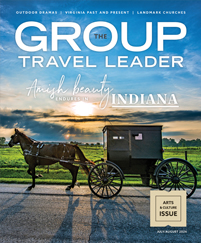The way you travel can make a positive difference in the life of someone you’ve never met.
Very often, conversations about travel center around places: “Where are you going? What are you going to see?” But in each of those places are people. And how travelers and tourism companies interact with those people can play a powerful part in shaping their communities — for good or for ill.
In recent years, thought leaders throughout the tourism industry have begun working on projects to help ensure that travel brings only good to residents of popular destinations. The power of tourism is often expressed in terms of economic impact, but these leaders have introduced the concept of “social impact.” Success, they say, isn’t just about how much money travelers spend in a destination. It’s also about the impact travelers make on the community while they’re there.
To help you appreciate the power of your travel habits to shape the future of the places you visit, we talked to six pioneers in the movement toward socially responsible travel. These tour operators, hotel consultants, nonprofit leaders and destination marketing executives shared their stories of inspiration and offered ideas on how you can make a positive difference as you travel throughout the world.
G Adventures: ‘A Social Enterprise’
Many travel planners know G Adventures as a small-group tour company with a catalog of engaging experiences in places all around the world. But the company’s mission is bigger than just running trips.
“G Adventures is a social enterprise,” said national sales manager Jeremy Brady. “Our primary focus is to take travelers into destinations with local guides to further educate people and help them become better citizens while also knowing that their travel dollars make an impact. Our goal is to ensure we’re creating opportunities and livelihoods in the places we visit. We want to bridge the divide between tourists and locals.”
The company accomplishes this by evaluating each component of a trip to make sure the funds spent stay in the local community. They work with locally owned hotels and encourage travelers to eat in small local restaurants.
They also have a nonprofit foundation that helps create tourism-related opportunities in destinations they take trips to. In Peru, for example, they helped establish a restaurant in a remote area of the Sacred Valley of the Inca.
“There were a lot of travelers going through the area, but the local communities were suffering,” Brady said. “We wanted to cut down on the drive, because there were no restaurants between the Sacred Valley and Machu Picchu. So we found a stop and trained locals with a culinary expert. We trained locals to be servers. We get beautiful food that’s grown locally, and we’re creating livelihoods and opportunities.”
Brady said groups can bring this commitment to social impact when they travel by working with travel providers in advance to make sure they are working with local entrepreneurs and supporting the communities they visit.
Warren Green and Associates: ‘Commitment to the People’
Born in South Africa, Warren Green has spent much of his career in hotels, restaurants and game reserves throughout Africa. In 2009, he launched his own consulting company, Warren Green and Associates, to help address a need he saw for sustainable practices in safari destinations.
The company works with game reserves and safari camps to create environmentally sustainable practices. But Green also guides them in helping to preserve and enhance the human communities in these remarkable natural landscapes.
“If you think about the pillars of sustainability, most people consider commitment to the environment,” he said. “But you also have to have a commitment to the people you find in that environment. The protection of culture and development of culture is important to tourism.”
One of Green’s clients, the Bush Camp Company, operates a small game lodge in Zambia. The lodge’s owners have identified ways to support the local indigenous communities by digging wells and building schools.
“From their schools, they have employed future staff,” Green said. “I met a guy last year who came from a secondary school they had set up and funded. He was in his early 20s and has a dream of becoming the best safari guide in Africa. He’s very proud to say that the lodge found him at the school. Now he has developed into a fantastic guide.”
Another client in Tanzania helped an aspiring entrepreneur fund a small tour business in his local village. The company now takes travelers to explore a vibrant community they never would have visited on their own and treats them to a multicourse traditional lunch prepared by locals.
Green said travel planners should look for partners who support nonprofits in the places they visit and ask how many locals are being employed there.
Jordan Tourism Board: ‘Empowering Communities’
In a region of the world known for both abundant oil reserves and frequent conflict, Jordan has neither. So tourism is a critical part of its economy, and leaders of the Jordan Tourism Board are focused on connecting visitors to social enterprises and authentic encounters with locals.
In early 2018, the tourism board partnered with Tourism Cares to launch the Meaningful Travel Map, a project that highlighted a dozen social enterprises where travelers can make long-term, positive impacts on small communities.
“We’re looking for ways for local communities near iconic sites to get a part of the tourism dollars,” said Malia Asfour, executive director of the Jordan Tourism Board North America and one of the visionaries behind the Meaningful Travel Map. “If you go into a less populated area 10 kilometers away from an iconic site, the local village can benefit from you going there and having a meal.”
The Meaningful Travel Map highlights numerous business and co-ops that are owned by women. When travelers visit, shop, eat and stay at these places, it gives local women economic leverage they wouldn’t have otherwise.
“Tourism dollars are helping to educate more women,” Asfour said. “When you give a skill to a woman, you feed a village, and you’re empowering communities. These women are putting their kids through college and learning skills they didn’t have before.”
Asfour said wherever they go, groups can support local communities by avoiding souvenir shops that sell goods mass-produced in China and, instead, buying goods made by local artisans. And she suggested that travel planners contact tourism boards in advance to learn more about social impact opportunities in the places they visit.
TreadRight Foundation: ‘Concerted Effort’
With a portfolio that includes Trafalgar, Contiki, Insight Vacations, Uniworld Boutique River Cruise Collection and 25 other tourism and hospitality brands, the Travel Corporation is one of the world’s largest and most influential travel organizations. In 2008, the company launched its philanthropic arm, the TreadRight Foundation, and continues to be its sole funder.
TreadRight focuses on three pillars of sustainability: people, planet and wildlife.
“Our primary goal is to make travel matter,” said Shannon Guihan, TreadRight’s programs director. “We want to work with suppliers and brands to make sure guests on our trips or cruises appreciate how impactful their purchasing decisions can be.”
To that end, TreadRight operates more than 50 sustainability and social impact projects in 26 countries. Many of these projects not only improve local living conditions but also create opportunities for the Travel Corporation’s customers to connect with the culture. In Florence, the organization helped a local heritage weaver set up an e-commerce platform. They also assisted her in making her studio space group-friendly, and today Trafalgar and Insight Vacations groups visit her during their tours in Italy.
Similar work is underway in Jordan. Travel Corporation CEO Brett Tollman attended the Tourism Cares event in Jordan last year and was so moved by one of the social enterprises he saw that he directed TreadRight to help fund improvements and consulting projects there. And several of the company’s brands added extra nights to their Jordan itineraries in order to take travelers to these out-of-the-way places.
“It’s a gargantuan effort,” Guihan said. “I work directly with the product teams and go to their travel manager training sessions. It’s deeply engrained in the organization from top to tail. To weave something like this into an itinerary takes a very concerted effort at all levels.”
Tourism Cares: ‘Directly Benefit Local Communities’
Since the early 2000s, Tourism Cares has been an industrywide nonprofit that organizes travel companies for service projects around the U.S. But in recent years, its vision has expanded, in terms of both geography and impact.
“We have 160 companies at our table, some of the biggest companies in travel,” said chief impact officer Paula Vlamings. “How do we leverage that to have an impact and do good in the places we’re bringing travelers?”
To that end, Tourism Cares has begun putting more emphasis on helping tourism leaders understand the power of travel to improve the lives of people around the world. After its successful event in Jordan in 2018, the organization held a similar summit in Puerto Rico this year, and it is planning another for Columbia sometime next fall.
“The demand for purpose-driven, authentic travel is growing,” Vlamings said. “Travelers want to be part of the solution, not part of the problem. So we want to educate them about how to do that and how to have more of a local experience so they’re interacting with the community more directly.”
Along with that direct experience comes more direct economic benefit. Vlamings said worldwide, only about 10% of tourist dollars stay in the local communities that travelers visit, and Tourism Cares wants to help increase that percentage.
“We want to directly benefit local communities and local suppliers,” Vlamings said. “So we’re helping people understand how their tourism dollars can have a local impact.”
Visit Anaheim: ‘Reaching Out’
Like all destination marketing organizations around the country, Visit Anaheim in Southern California works to promote the city as a destination for meetings, conventions, group tours and individual vacations. But in the past few years, it has also noticed that organizations coming to town are asking for ways to get involved in the local community.
“We’ve seen this trend: All conventions are looking more and more to do something to give back to the community,” said president and CEO Jay Burress. “So now, we’re really encouraging all our groups to look at what they can do to give back.”
To assist in that mission, Visit Anaheim has begun taking steps that aren’t a normal part of a CVB’s function.
“We’ve really made an effort to find out about local nonprofits and opportunities for giving back and making an impact here,” Burress said. “We’ve started being proactive and reaching out to them to learn about them. We’ve developed a database of who they are and what to do. Now, when someone calls us for information about service projects to do with their teams, we can match them with those organizations.”
The CVB also created its own nonprofit, Visit Anaheim Cares, to fundraise for and support many of the community organizations contributing to positive change around town.
“We can’t all have philanthropic bank accounts,” Burress said. “But we can all have philanthropic hands.”











